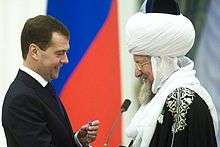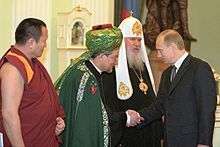Talgat Tadzhuddin


Talgat Tadzhuddin (born Talgat Safich Tadzetdinov, Russian: Талгат Сафич Тадзетдинов; Tatar: Тәлгать Сафа улы Таҗетдин Tälğät Safa ulı Tacetdin), born 12 October 1948 in Kazan) is a Russian Shaykh al-Islām.[1] He was Chief Mufti of Russia and head of the Central Muslim Spiritual Directorate of Russia, from 1992 until the end of 2015.[1]
Biography
Talgat Tadzhuddin was born in Kazan, the USSR, on 12 October 1948 to a Tatar family. His father was a lorry driver, his mother worked at a factory.
In 1966, he was admitted at the Mir-i Arab Madrassah in Bukhara (then in the USSR), which he finished with honours in 1973.
He also studied at Cairo′s Al-Azhar University in 1978.
In 1973, he was elected second imam khatib of the historical Märcani Mosque in Kazan, in 1978 he was elected first imam of this mosque.
On 19 June 1980, he was elected a mufti and chairman of the Spiritual Muslim Directorate of the European Part of the USSR and Siberia (DUMES), one of four such directorates in the USSR then.
In May 1990, the conference of heads of Muslim Spiritual Directorates of the USSR elected him chairman of the directorate for international relations of the USSR′s Muslim organisations, later the Association of external relations of Muslim organisations, which he still heads.
In 1992, DUMES was transformed into the Central Muslim Spiritual Directorate of Russia and the European countries of the CIS; the rank of Chief Mufti was created and bestowed on Talgat Tadzhuddin.
In December 2015, Talgat Tadzhuddin, according to his own statements, relinquished his administrative positions.[2]
Public statements
Tadzhuddin has at least on one occasion claimed that he is Bulgar, arguing that Tartars are the descendants of Volga Bulgaria after it fell during the Mongol invasions.[3]
In February 2006, Tadzhuddin joined leaders of the Russian Orthodox Church as well as the city of Moscow government in protesting against a planned gay pride parade in Moscow. He urged Russia's Muslims to stage violent protests if the march went ahead: "If they come out on to the streets anyway they should be flogged. Any normal person would do that - Muslims and Orthodox Christians alike [...] [The protests] might be even more intense than protests abroad against those controversial cartoons." [4][5]
After in the autumn 2015, Russia began its military intervention in Syria, speaking to the IV World Qoroltai of the Bashkirs in Ufa in November 2015, Tadzhuddin reported his chat with Russian president Vladimir Putin at the celebration ceremony of the Unity Day several days prior, thus, "I addressed him: Vladimir Vladimirovich, perhaps we should do to Syria and Israel what we have done to Crimea? [...] We ought to take [them]. May Russia extend to Mecca."[6]
Honours and awards
- Order of Honour (12 October 2008) - for services to the development of spiritual culture and strengthening friendship between peoples
- Order of Friendship (21 September 1998) - for his great contribution to strengthening friendship and cooperation between peoples. [5]
- Order of St. Prince Daniil Moskovsky, 2nd class (Russian Orthodox Church, 2008) - for strengthening inter-religious peace and harmony
References
| Wikimedia Commons has media related to Talgat Tadzhuddin. |
- 1 2 "Муфтий в отставке: Талгат Таджуддин покинул пост лидера российских мусульман". TASS. 24 December 2015. Retrieved 27 December 2015. (in Russian)
- ↑ Муфтий Таджуддин избрал лидера мусульман Татарстана одним из руководителей своего муфтията
- ↑ Interview with Talgat in Russian, date unknown.
- ↑ Russia's first gay parade vetoed by 'outraged' city The Independent, 17 February 2006.
- ↑ Таджуддин призвал "лупить" геев NEWSru, 15 Feb 2015.
- ↑ В Кремле не поняли идею муфтия о присоединении Израиля и Сирии к России Lenta.ru, 25 Nov 2015.